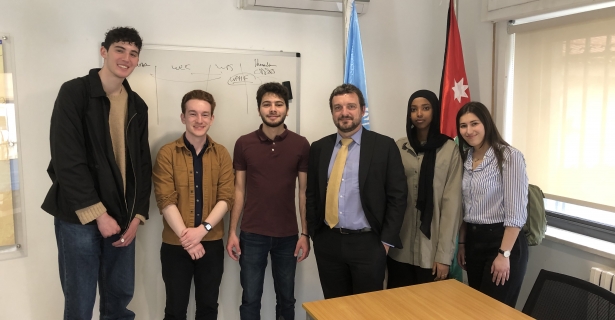In Jordan, the majority of university students are women. Though despite educational attainment, Jordan has one of the lowest employment rates for women; not just in the region, but in the world. In my research, I hope to understand what systemic barriers exist for women in Jordan, and better understand the sorts of initiatives NGOs and the Jordanian government are undertaking to help reach gender parity in the labor force.
After interviewing academics and USAID representatives earlier in the week, today we were conducting our first interview with representatives from the Jordanian government. With the sun barely risen over the many hills of Amman, we made our way over to the central office of the Jordanian Cooperative Corporation— a governmental organization set up to oversee the formation, regulation, and development of all economic cooperatives in the country. There, we met with a representative who spoke to the country’s current strategies regarding the development of the sector, and existing barriers to female labor force participation. The representative mentioned that while Jordan’s agricultural sector receives aid from USAID and related programs, what is really needed for expansion of the sector is technology transfer from the US and other donor countries. Additionally, while Jordan has a relatively large public sector, limited growth in the private sector has put undue pressure on hiring in the public sector. As a result, fewer women are being selected to fill positions in the cooperative sector.
In the afternoon, we made our way to west Amman where we met with the head of UN Women in Jordan. In our conversation, he covered UN Women’s current initiatives for increasing Jordanian women’s economic empowerment, as well as initiatives for Syrian women living in Azraq and Zaatari. In speaking with UN Women, we found that the largest barriers to women attempting to engage in the labor force are the lack of reliable transportation, cultural norms, but also the lack of opportunities outside of the public sector. Given funding limitations, UN Women has sought to work with the Jordanian private sector to expand equity messaging to seek foreign investment from impact investors outside of Jordan.
After a morning full of interviews, a group of us made our way back to the neighborhood of Jabal Al-Weibdeh where we embarked on a tour of the city's vibrant street art scene. In Amman, it’s hard to walk more than a couple feet without seeing a breathtaking mural, or a tag tucked away in one of Amman’s many alleys and sleepy side-streets. The street art scene not only envelopes Amman in a
dazzling palette of color, but also serves as an expression of youth that envision a more progressive Amman. Of the 50 or so street artists that are most active in Amman, 35 are women. So, while many barriers still exist in the country, the youth are seeking to build an Amman, to build a Jordan, that is reflective of country’s true diversity.

